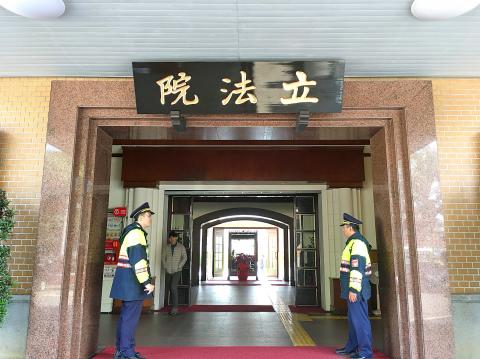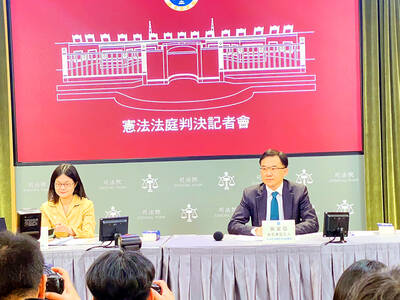President Tsai Ing-wen (蔡英文) yesterday said that her administration would push an initiative through the Legislative Yuan that would outlaw the activities of “Chinese communist surrogates.”
The legislation would strictly regulate activities by people, groups or institutions that could undermine national security by spreading Chinese propaganda, making statements on Beijing’s behalf, or participating in official events hosted or organized by China, Tsai said on Facebook
The proposal is to be introduced when the legislature begins its new session in September, she said, adding that she hopes it could pass before the end of the session.

Photo: Lin Liang-sheng, Taipei Times
Tsai also expressed gratitude to lawmakers for passing amendments to the Act Governing Relations Between the People of the Taiwan Area and the Mainland Area (台灣地區與大陸地區人民關係條例) on Wednesday.
Retired officers who held the rank of major general or above and civil servants of vice ministerial rank or above are prohibited from divulging state secrets or attending official events held by China, she said.
Penalties stipulated by the amended act include the revocation of pensions or fines of up to NT$10 million (US$321,471), she added.
Taiwan is a free nation where people can form different political beliefs, and most veterans are patriotic and rightfully enjoy their pensions, Tsai said.
However, a minority of generals should not be allowed to travel to China to sing the Chinese national anthem or salute the communist flag, as such actions are detrimental to Taiwan’s interests and dignity, she said, adding that such people deserve the “severest penalties” under the law.
Democratic Progressive Party (DPP) lawmakers have agreed to set additional amendments to the act that Tsai’s administration has proposed as a legislative priority for the upcoming session, sources said.
An additional clause to Article 33 would stipulate penalties for people, groups or institutions that have acted against Taiwan’s national security or social stability as surrogates of the Chinese Communist Party, the Chinese government or China’s armed forces, they said.
Another clause would stipulate penalties for spreading Chinese propaganda, attending events held by Chinese officials or making joint statements with the Chinese government if those activities are deemed harmful to Taiwan’s national security or conducted on China’s behalf, they added.
The sources did not disclose details about proposed penalties, but described them as severe.
DPP Legislator Kuan Bi-ling (管碧玲) confirmed that the amendments have been sent to the appropriate committee for deliberation.
Chinese Nationalist Party (KMT) caucus whip William Tseng (曾銘宗) was noncommittal, saying that the KMT’s disposition depends on whether the legislation is a genuine boost to national security or an electoral stratagem of the DPP.
“The KMT will oppose to the last any law that exceeds that which is necessitated by national security,” he added.
Additional reporting by Su Fun-her and Chen Jen

TRAGEDY STRIKES TAIPEI: The suspect died after falling off a building after he threw smoke grenades into Taipei Main Station and went on a killing spree in Zhongshan A 27-year-old suspect allegedly threw smoke grenades in Taipei Main Station and then proceeded to Zhongshan MRT Station in a random killing spree that resulted in the death of the suspect and two other civilians, and seven injured, including one in critical condition, as of press time last night. The suspect, identified as a man surnamed Chang Wen (張文), allegedly began the attack at Taipei Main Station, the Taipei Fire Department said, adding that it received a report at 5:24pm that smoke grenades had been thrown in the station. One man in his 50s was rushed to hospital after a cardiac arrest

PUBLIC SAFETY: The premier said that security would be tightened in transport hubs, while President Lai commended the public for their bravery The government is to deploy more police, including rapid response units, in crowded public areas to ensure a swift response to any threats, President William Lai (賴清德) said yesterday after a knife attack killed three people and injured 11 in Taipei the previous day. Lai made the remarks following a briefing by the National Police Agency on the progress of the investigation, saying that the attack underscored the importance of cooperation in public security between the central and local governments. The attack unfolded in the early evening on Friday around Taipei Main Station’s M7 exit and later near the Taipei MRT’s Zhongshan

ON ALERT: Taiwan’s partners would issue warnings if China attempted to use Interpol to target Taiwanese, and the global body has mechanisms to prevent it, an official said China has stationed two to four people specializing in Taiwan affairs at its embassies in several democratic countries to monitor and harass Taiwanese, actions that the host nations would not tolerate, National Security Bureau (NSB) Director-General Tsai Ming-yen (蔡明彥) said yesterday. Tsai made the comments at a meeting of the legislature’s Foreign Affairs and National Defense Committee, which asked him and Minister of National Defense Wellington Koo (顧立雄) to report on potential conflicts in the Taiwan Strait and military preparedness. Democratic Progressive Party (DPP) Legislator Michelle Lin (林楚茵) expressed concern that Beijing has posted personnel from China’s Taiwan Affairs Office to its

‘ILLEGAL RULING’: The KMT and the TPP slammed the Constitutional Court judgement, saying it contravened the law and was trying to clear the way for a ‘green dictatorship’ The Constitutional Court yesterday ruled that amendments to the Constitutional Court Procedure Act (憲法訴訟法) passed by the Legislative Yuan last year are unconstitutional, as they contravene due legislative process and separation of powers. The Legislative Yuan on Dec. 20 last year passed amendments stipulating that no fewer than 10 grand justices must take part in deliberations of the Constitutional Court, and at least nine grand justices must agree to declare a law unconstitutional. The Executive Yuan on Jan. 2 requested that lawmakers reconsider the bill, but the Legislative Yuan, under a combined majority of Chinese Nationalist Party (KMT) and Taiwan People’s Party